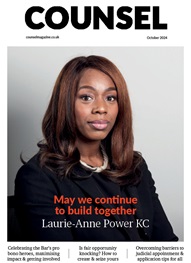*/
Regulation
Chambers and sole practitioners will be “risk-rated” under a Bar Standards Board supervision scheme from January, which will underpin the new Handbook.
Those identified as “high risk” will be supported by the regulator to reduce the likelihood of serious problems occurring.
“Well-run chambers, which set out and comply with clear policies on matters such as complaints handling and pupillage training, will gain a low risk rating and will have little contact with the BSB,” announced the regulator, so that resources are concentrated on “those who need it most”.
Chambers will be assessed against potential risks of ineffective or dishonest governance; poor client service; insufficient consideration of equality and diversity; inadequate or unfair pupillage or training; and incompetent or dishonest financial management.
The new supervision arrangements were introduced following a consultation earlier this year and replace the monitoring system implemented in 2010, in which chambers were contacted to verify compliance in key areas.
Announcing the new scheme, the Bar Standards Board’s Head of Quality, Oliver Hanmer, said: “We all know that prevention is better than cure. This new approach is about smarter regulation for the Bar and better protection for the public. Working with us to prevent potential risks materialising will mean minimising the amount of supervision chambers receive, and a more targeted use of resources on our part.”
Chambers will receive an impact audit survey next spring to identify the impact that any potential breach of the regulatory rules would have on the public and consumers. Most chambers will then have to complete a Supervision Return form – detailing how effectively potential risks are being managed to help the BSB determine the likelihood of them materialising.
Matthew Nicklin QC, Chair of the BSB’s Standards Committee, assured Bar Conference delegates that this would not be a “Big Brother” style of monitoring (see p22).
“Well-run chambers, which set out and comply with clear policies on matters such as complaints handling and pupillage training, will gain a low risk rating and will have little contact with the BSB,” announced the regulator, so that resources are concentrated on “those who need it most”.
Chambers will be assessed against potential risks of ineffective or dishonest governance; poor client service; insufficient consideration of equality and diversity; inadequate or unfair pupillage or training; and incompetent or dishonest financial management.
The new supervision arrangements were introduced following a consultation earlier this year and replace the monitoring system implemented in 2010, in which chambers were contacted to verify compliance in key areas.
Announcing the new scheme, the Bar Standards Board’s Head of Quality, Oliver Hanmer, said: “We all know that prevention is better than cure. This new approach is about smarter regulation for the Bar and better protection for the public. Working with us to prevent potential risks materialising will mean minimising the amount of supervision chambers receive, and a more targeted use of resources on our part.”
Chambers will receive an impact audit survey next spring to identify the impact that any potential breach of the regulatory rules would have on the public and consumers. Most chambers will then have to complete a Supervision Return form – detailing how effectively potential risks are being managed to help the BSB determine the likelihood of them materialising.
Matthew Nicklin QC, Chair of the BSB’s Standards Committee, assured Bar Conference delegates that this would not be a “Big Brother” style of monitoring (see p22).
Regulation
Chambers and sole practitioners will be “risk-rated” under a Bar Standards Board supervision scheme from January, which will underpin the new Handbook.
Those identified as “high risk” will be supported by the regulator to reduce the likelihood of serious problems occurring.


Our call for sufficient resources for the justice system and for the Bar to scrutinise the BSB’s latest consultation
Marie Law, Head of Toxicology at AlphaBiolabs, discusses alcohol testing for the Family Court
Louise Crush of Westgate Wealth explains how to make sure you are investing suitably, and in your long-term interests
In conversation with Matthew Bland, Lincoln’s Inn Library
Millicent Wild of 5 Essex Chambers describes her pupillage experience
Louise Crush of Westgate Wealth explores some key steps to take when starting out as a barrister in order to secure your financial future
From a traumatic formative education to exceptional criminal silk – Laurie-Anne Power KC talks about her path to the Bar, pursuit of equality and speaking out against discrimination (not just during Black History Month)
James Onalaja concludes his two-part opinion series
Expectations, experiences and survival tips – some of the things I wished I had known (or applied) when I was starting pupillage. By Chelsea Brooke-Ward
If you are in/about to start pupillage, you will soon be facing the pupillage stage assessment in professional ethics. Jane Hutton and Patrick Ryan outline exam format and tactics
In a two-part opinion series, James Onalaja considers the International Criminal Court Prosecutor’s requests for arrest warrants in the controversial Israel-Palestine situation